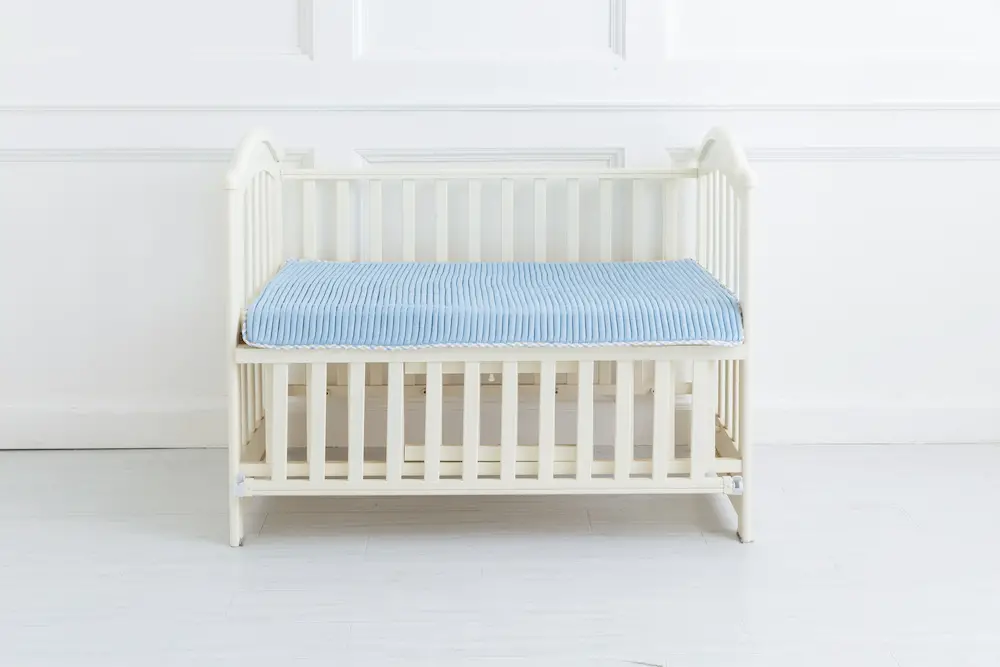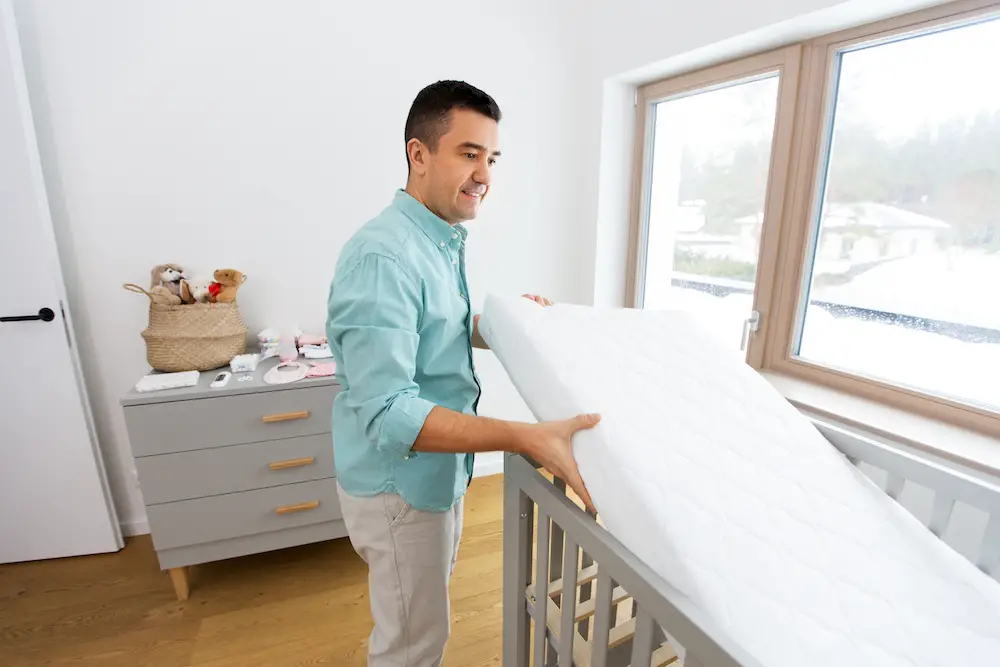There’s a lot of excitement that comes with expecting a baby.
Especially if you’re a new parent, one of the most enjoyable is setting up the nursery.
In your quest to come up with the best setup, you probably come across two-stage mattresses.
What’s great about this mattress is your little one can use it not only during infancy but throughout his initial years.
The key is knowing when to flip mattress for baby.
To help a fellow new parent out, here’s what you need to know about this innovative mattress.
What Are Two-Stage Mattresses?
A two-stage crib mattress has two sides with varying firmness to accommodate your child’s needs as he grows.
Basically, you will get one infant/baby side and another toddler side.
Most two-stage mattresses are designed with a label that identifies each side.
Still, it’s reasonably easy to distinguish one side from the other even without it.
The infant/baby side is solid and flat, which is beneficial in providing support and safety.
On the other side, the mattress is softer and less firm, which is better for toddlers.
Why Use a Two-Stage Crib Mattress?
There are a couple of notable reasons parents opt for a two-stage mattress instead of buying two separate beds.
Economical
As you can imagine, it is simply not practical to buy too many items that are only usable for a short time.
There’s no doubt that your baby will outgrow his bed faster than you could ever imagine.
Therefore, there’s no point in buying a mattress now only to buy another one in a few months.
What’s more, crib mattresses aren’t inexpensive, so having a two-stage mattress will save you some dollars.
Convenience
A two-stage crib mattress’ dual-purpose quality is its best selling point, as it exempts the parents from getting a new mattress.
Once you flip it, it essentially becomes a new bed that will help your child achieve quality sleep.
Not only will it save you the hassle of going to the store to buy a new bed but save your precious time as well.
Durability
Two-stage mattresses typically have a considerably longer lifespan than one-sided mattresses.
Also, flipping it gives the padding underneath more chances to recuperate, contributing to the mattress’ extended life.
Eco-Friendly
The long service life and functionality of two-stage crib mattresses mean less usage of machines and new materials that produce new ones.
As such, choosing to have this kind of mattress for your child also impacts the environment positively.
Types of Two-Stage Crib Mattresses
You will find tons of two-stage mattresses available in the market.
To help you find the right pick, they are categorized into two primary types.
Innerspring Crib Mattress
Innerspring crib mattresses feature coils made of heat-tempered steel.
What’s impressive about these coils is that they are able to return to their original form quickly after being bent out of shape.
Innerspring crib mattresses are preferred because the steel coils are durable.
Coil baby mattresses can weigh anywhere from 10 to 20 pounds depending on the inner core and cushion.
For innerspring mattresses, the volume of layers, the materials used, comfort level, and the cover all impact the pricing.
Foam Crib Mattress
High-density polyurethane foam is often the material of choice when making foam crib mattresses.
There is usually a polyethylene core in all foam crib mattresses that weigh as light as five or six pounds.
For two-stage mattresses, the toddler side is made softer using either gel or memory foam.

When to Flip Mattress for Baby
In regards to when to flip mattress for baby, most parents switch the sides at around 12 months, but your child may be ready earlier or later.
A pediatrician may advise to flip it sooner or later than expected based on factors such as weight, growth, temperament, and overall health.
Consulting with a pediatrician first before flipping your baby’s crib mattress is highly advisable.
Should a Two-Stage Crib Mattress be Firm?
As mentioned, the baby/infant side of two-stage mattresses is firmer than the toddler side, but why?
How will your baby have a restful night if his bed is that firm?
Experts recommend that newborns sleep on firm or even hard beds to reduce the incidence of SIDS (sudden infant death syndrome) and other accidents.
Increased bone support and ease of rolling over are other benefits that babies will get from sleeping on a firm crib mattress.
On the contrary, a soft, cushioned mattress might adapt to the baby’s head shape.
When that happens, the risk of suffocation and SIDS increases.
The reason is that babies are prone to sinking in soft mattresses, which could affect their breathing.
While it may appear like a bad idea to put your baby on a firm mattress, it actually meets the requirements they need to get safe, quality sleep.
How to Pick the Best Two-Stage Crib Mattress
If you’re in the process of searching for a good mattress for your little one, here are the top considerations to keep in mind.
1. Materials
The majority of new parents prefer baby products that use organic materials.
Often, they also intentionally choose environment-friendly products to keep their youngster away from harsh chemicals.
Among the best organic materials used in crib mattresses are cotton and coconut husk fiber.
To make sure your two-stage mattress is made of safe materials, look for a GOTS and/or GOLS certification.
These stand for Global Organic Textile Standard and Global Organic Latex Standard.
2. Support and Firmness
To ensure optimal sleep, look for a crib mattress that offers the appropriate amount of firmness on both sides.
What’s more, it should provide your little one with the right level of support in all the right places.
Again, the infant side has to be firm enough that your kid does not sink into the mattress.
It should allow your child to roll around easily to prevent suffocation and other accidents.
In comparison, the toddler side should be a tad plusher than the infant side.
It must have the support needed by developing kids as they move and wiggle during sleep or rest.
Watch out for reinforced edges to sustain jumping toddlers while preventing babies from getting stuck on the sides.
3. Comfort and Breathability
For the baby’s comfort, pick a crib mattress that exhibits superior ventilation.
You can look for a mattress that use an organic cotton cover, which is known to be highly breathable.
In fact, even the foam itself should allow air to pass through so that your baby feels fresh through the night.
4. Waterproof
A waterproof mattress will prevent liquids from seeping through the foam.
As a result, the mattress stays dry and dust mites and bed bugs are kept at bay.
At the same time, it also means keeping the mattress clean and sanitized will be a breeze.
Often, you can wipe away spills and dirt on a waterproof mattress using a damp cloth.
5. Weight
In case you don’t know, you will probably have to change the sheets on your baby’s crib mattress several times a week.
To make this easier for you, get a lightweight mattress that you can flip with no problems.
This way, you won’t need to exert too much effort just to have the sheets replaced.
Conclusion
A two-stage crib mattress offers convenience and other positives to parents who want to provide the best care for their little one.
While getting a good mattress is important, learning when is the right time to flip it is also essential.

